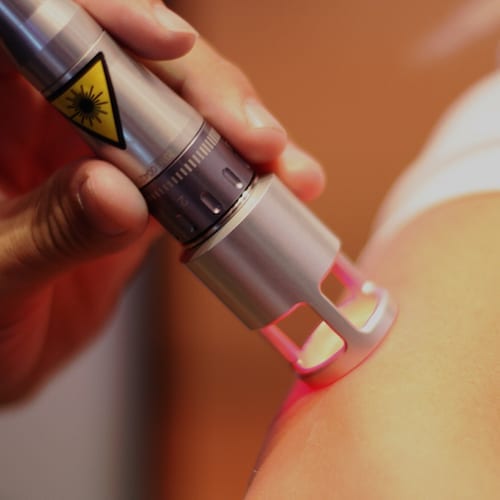
The term “laser therapy” refers to a number of different medical and cosmetic procedures that make use of focused light or laser beams.
Today, all kinds of applications exist for this cutting-edge, non-invasive to minimally invasive treatment modality. Patients are able to return to their daily life much more quickly with few if any side effects.
But before scheduling your first laser therapy treatment, it is important to understand that laser therapy in and of itself is not a “miracle cure.” These are the 10 most important things you need to know to be sure this is the right treatment for you!
- The laser therapy provider you select is what matters most.
The American Academy of Dermatology (AAD) states that laser therapy results are linked to the skill and expertise of your treatment provider.
When selecting your Ultimate Health Care Laser provider, look for a practice that specializes in laser treatment, not a practice that just offers it “on the side” among a menu of other, primary treatments.
Be sure the provider has positive testimonials and references and take the time to view their before/after gallery (if available) for samples of treatment results.
- Arrive at your initial consultation with a full medical history.
Depending on the reason for your laser therapy treatment, it is vital to let your provider know your full medical history, including past or current skin conditions, medications, supplements and family medical history (if available).
While you may not think that a simple over-the-counter supplement or vitamin might interfere with the effectiveness of your therapy treatment, your provider can advise you best.
So be sure to provide a full list of medications, supplements, vitamins, lifestyle habits and medical conditions before the day of your treatment.
- Some laser therapy treatments may require advance preparation.
Because there are so many applications for laser therapy, your provider can best advise you on whether any advance preparation is necessary before your treatment.
In some cases, your provider may request that you cease from use of tobacco products or alcohol and stop certain medications before your treatment, especially if you are taking any medications that interfere with blood clotting ability.
In other cases, you may not need to make any advance preparations at all.
- Be sure to follow your provider’s post-treatment recommendations in full.
It is great to make the investment in laser therapy to look and feel your best. But the only way you will get the full benefit of your treatment is if you adhere to every aspect of your provider’s post-treatment recommendations.
For example, you may need to restrict your activities for a time until your body heals. You may need to use special skin lotion or stop wearing makeup.
If you have had laser therapy on an area like your face or hands that receives regular sun exposure, your provider will likely ask that you wear sunscreen and do your best to minimize sun exposure during peak hours.
All of these temporary post-treatment recommendations are made to ensure you get the best results from your investment.
- Laser therapy is not painful but there may be some discomfort.
Different people have vastly different pain tolerances. As well, certain areas of the body can be naturally more sensitive than other areas of the body.
Depending on your personal pain tolerance and where your treatment is being done, you may experience no discomfort or mild discomfort during your laser therapy. Many patients report it feels somewhat like being pinched or having a mild sunburn.
Fortunately, topical anesthetic creams or chilled gels can usually alleviate any temporary discomfort during your treatment.
- Laser therapy can create some temporary post-treatment side effects.
Some patients have no side effects after their laser therapy. Other patients may experience some temporary side effects.
This usually depends on where your laser therapy treatment is being done. The most common patient-reported side effects include burning, swelling, bruising or discoloration at the treatment site, bleeding, scarring and itching.
Infection is always a risk as well – talk with your provider about how to limit your risk.
- Laser therapy can be used for a wide variety of treatments.
Both cosmetic and medical treatments are often performed with the aid of laser light therapy.
The American Society for Dermatologic Surgery (ASDS) cites the benefits of laser light therapy for treatment of skin scarring from acne, sun damage, stretch marks, wrinkles, hair removal, lesions, birthmarks, spider veins and even tattoo removal.
To find out whether laser therapy is the best choice for your cosmetic or medical issues, talk to your provider.
- Not everyone is a good candidate for laser therapy.
In some cases, it may be wise to delay your laser therapy procedure. For example, if you are pregnant, breastfeeding or trying to conceive, your provider may recommend postponing your laser therapy treatment.
Depending on the area to be treated and your current and past medical conditions, you may also need to postpone treatment if your skin forms keloid (raised) scars, you are currently being treated for acne, you have known recurrent skin disease, you have recently had severe sunburn or you are taking blood thinners or any medications that could interfere with treatment results.
- It may take time to see the full results of your treatment.
Many patients are surprised to learn they won’t see the full results of laser therapy right away. However, it can take time for temporary side effects to fade and your body to heal fully.
In some cases, you may see the results in days or weeks. In other cases, it may take months.
- You may need more than one treatment to achieve your goals.
Your provider can tell you whether your medical or cosmetic goals may require more than one laser therapy treatment.
Now that you know more about laser therapy, you can decide if this is the right treatment option to achieve your goals!
